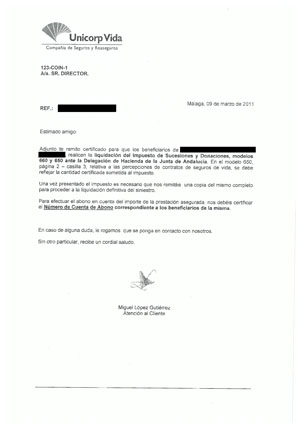 Unlike Nordea Bank Luxembourg, Unicaja is sending letters out to the beneficiary of a life insurance policy requesting proof that an IHT form was returned to the Spanish Tax Office, prior to releasing the funds. The bank even specifies the sum of money that needs to be declared and the appropriate box in the form, and they will not release any payments under life insurance policies until this is verified.
Unlike Nordea Bank Luxembourg, Unicaja is sending letters out to the beneficiary of a life insurance policy requesting proof that an IHT form was returned to the Spanish Tax Office, prior to releasing the funds. The bank even specifies the sum of money that needs to be declared and the appropriate box in the form, and they will not release any payments under life insurance policies until this is verified.
- Why would Nordea Bank Luxembourg not do this? Very simple, they sold the Unit-Linked policy to precisely avoid the taxes which payment they are legally bound to supervise: the fox looking after the hen house.
- What does this entail for Nordea Bank? Automatically, they become liable for not only scheming to defraud the Tax Office, an offence that
could see them be prosecuted criminally but by virtue of article 8.b of the IHT Act 1987, they become “substitute taxpayers” if they pay out on life insurance policies without ensuring that the correct tax has been paid, save for the exceptional payment to the Spanish Tax Office, provided that a check is given to the beneficiaries under the policy and such check is written out to the appropriate Spanish tax department. - Could lawyers also be taken to task for aiding tax evasion? They could and they would, particularly where their professional and technical skills are used to assist in the commission of fraud.
- What is the most serious consequence if the client, and his bank, get caught out? Currently, where the unpaid tax exceeds €120,000 per tax year, the taxpayer and his accomplices could face imprisonment (up to 5 years) and more severe consequences if, for example, complex fiscal engineering or tax havens are employed to further the crime. A prison term is just unavoidable unless the taxpayer repents and decides to make a full disclosure, or Statute of Limitations kicks in.
Matters do seem to be coming to a head. My previous comment on the post “ERVA reports tax fraud to the Spanish Tax Office” As Erva now have the full details I supplied to them regarding certain information divulged to me, they are now in a position to denounce the person & bank involved to the Tax Office. I think any person who reads this should contact their lawyer and see if in fact all the information regarding the IHT was correctly detailed on the form by the bank. Come clean or you will be found out and prosecuted along with the bank for any wrong doing.
Thanks for your comment Sarah. Thanks also for providing such valuable information. It may be of interest for you to know that a “whistleblower” has been in touch and provided other most valuable information. It would seem that all is not rosy in the banks. All this information is being collated, checked and will then be submitted to the relevant tax office. In fact we have had a number of rulings from the tax office which after clarification will shortly be published on this site, so keep logging on, you are all going to have some pleasant surprises coming your way. Our lawyers Lawbird Legal Services Marbella have informed us that they are putting the finishing touches to a number of writs which will shorlty be filed in various courts.